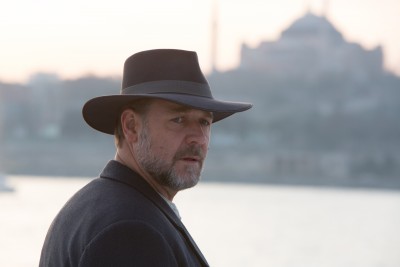
One hundred years ago, the Australian and New Zealand Army Corps (ANZAC) landed on Gallipoli, a peninsula in Turkey. After eight months of battle against the Ottoman army, they retreated. It is still considered one of the worst losses of WWI, resulting in over 250,000 Allied casualties.
Friday, Russell Crowe releases his uneven directorial debut, “The Water Diviner,” a film about the years following this battle.
In the film, based on a true story, Australian farmer Joshua Connor (Crowe) has lost his three sons to the campaign, the youngest of whom who was not even eighteen. Their mother (Jacqueline McKenzie) does not take the news of their missing-presumed-dead status well. She pretends the boys are still alive, even forcing Connor to read bedtime stories to three empty beds. It’s not a surprise when, after only one scene in which she berates Connor for not finding her sons, she drowns herself.
With nothing left for him in Australia, Connor sets off to Gallipoli to find his sons’ bodies and bring them home as their mother wanted. He uses his uncanny “water diviner” ability to find water in dry lands to help him locate two of his sons’ bodies — but discovers the third had been taken captive by the Turks.
Unfortunately, finding his missing son turns out to be even more difficult than expected due to the growing tensions between British soldiers and the Turks who resent British occupation of the Ottoman Empire. The head of the British embassy refuses to help, and no one has time to find a probable corpse in the middle of the chaos.
Assistance surprisingly arrives in the form of the Turkish Major Hasan (Yılmaz Erdoğan), who led the battle against ANZAC troops in Gallipoli and had a direct part in the deaths of Connor’s sons. The film actually opens with a portrayal of the ANZAC retreat as seen by Major Hasan, who is portrayed as proud, respectful and kind. Erdogan plays Hassan with tired gravitas and dignity, a powerful man exhausted by duty and humanity’s cruel ways.
“The Water Diviner” actually does an excellent job of humanizing “the enemy”. The Turks in the film are portrayed as reluctant warriors, the same as the ANZAC soldiers. While emotional attachment follows Connor’s search for his Australian sons, shots of mass graves labelled “Turkish bones” serve to show the real enemy is war itself.
This is perhaps best illustrated by the flashback battle scenes, which are gut-wrenching both in their gore and raw emotional value. Bits and pieces of the same gruesome sequence are replayed at various times in the movie, a technique which, while definitely not subtle, hammers home the reality of war.
This brutality and the idea that there is no “right side” are the film’s best features, but it is difficult to reconcile them with the inexplicable romantic subplot. Though his wife’s death is what sparks Connor’s trip to begin with, he wastes no time in falling for hotel manager Ayshe (Olga Kurylenko), who, echoing Connor’s wife’s denial, refuses to acknowledge her husband’s death. Kurylenko plays the traditional role of foreign-widow-in-need-of-a-man with no finesse, and the entire romance is sappy and insultingly traditional. At one point, Connor must literally rescue her from her violent brother-in-law, who fits perfectly into the stereotype of a sexist Muslim Turk.
Ayshe’s 10-year-old son (newcomer Dylan Georgiades) is a much better addition to the story. His innocence offsets the horrors around him, and his relationship with Connor adds a distinct parallel to Connor’s loss while lightening the mood with some comic relief.
In a film that works so hard to show the good and evil on both sides of a war, it is somewhat surprising to note the controversy over its complete erasure of the Armenian genocide, which began the day before the Battle of Gallipoli. The Turkish government denies the genocide ever occurred to this day, and some may take the film’s silence on the issue as a form of propaganda.
In terms of entertainment, the final result of Crowe’s labors is a mixed bag. Had the film stuck to a heavy and honest portrayal of warfare and its results on either side of the battlefield, it could have made a much better impact. Instead, the irritating and unoriginal romantic subplot, and perhaps its avoidance of a century-old atrocity, spoils the message.
























































































































